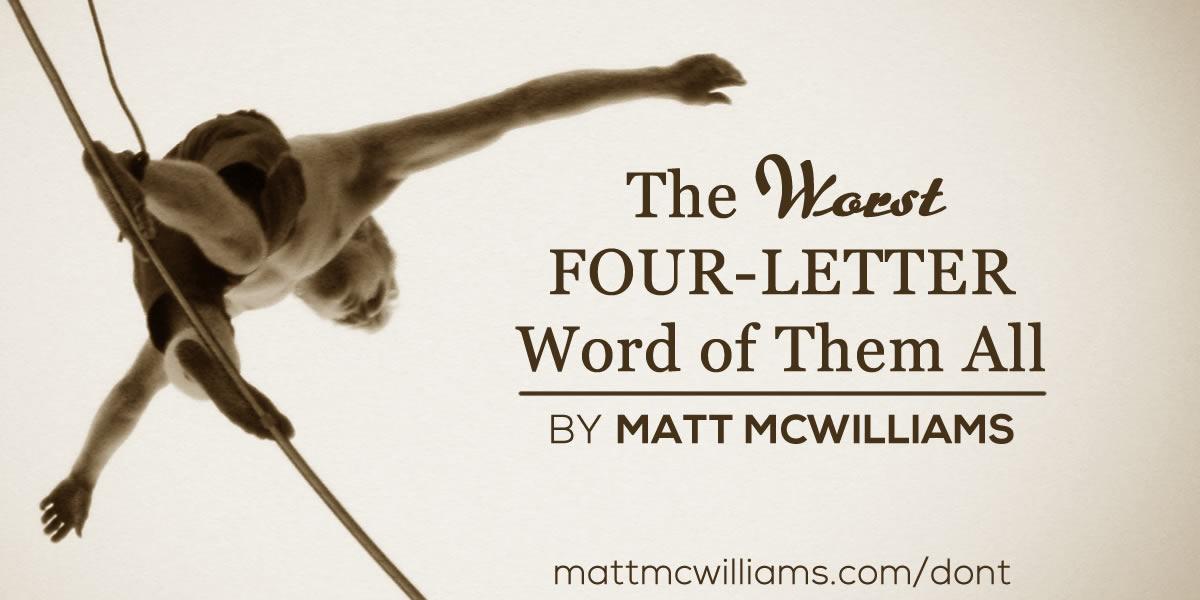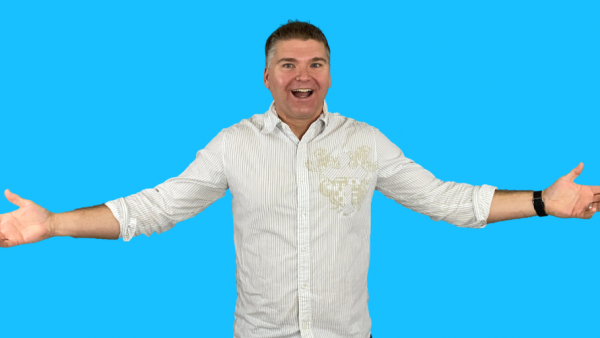There is a single word in the English language that will bury you. It’s the worst four-letter word of them all (psychologically speaking). It’s the word “don’t.”
The problem with this word is that your subconscious mind doesn’t understand the word “don’t.”
To illustrate, try this:
Don’t think of a piping hot pizza. Don’t picture it coming out of the oven with steam rising off the top of the bubbling cheese and glistening pepperoni. Don’t think of the amazing smells wafting from the kitchen.
Just writing that caused me to drool on my keyboard. If you are reading this at approximately 10am, my apologies. Treat yourself to a mid-morning snack.
You thought of the pizza, didn’t you? That’s how our minds work.
What Water? A Lesson from Golf
When I was 16, I was an average competitive golfer. I’d only been playing for three years and for the first two years, my progress was rapid. However, my progress completely stagnated in the third year. I wasn’t getting any better and it was frustrating. My biggest struggle was with the mental side of the game. I simply could not keep the negative thoughts out of my head.
Then my dad forced me to take nine weeks off from the game. This was like torture for a 16-year old aspiring professional golfer. But during that nine-week break, he bought me a book that set me on a path toward eventually being one of the top ranked college golfers in the nation. It literally changed my life and impacts me even today.
The book was Golf is Not a Game of Perfect by Dr. Bob Rotella, a performance psychologist who works with many of the top athletes in the world as well as top companies. That book showed me how the subconscious mind doesn’t process the word “don’t” quite like we want it to.
“Don’t hit it left” translates instantly into an image of the ball traveling left, splashing into the water that I so desperately wanted to avoid. When I said things like “don’t hit it left,” I was solidifying in my mind the very thing I didn’t want. I experienced all the accompanying emotions of the ball in the water, as if it had already happened, such as:
- Disappointment
- Defeat
- Frustration
As I read the book, I thought of one particular hole at my home course that had given me fits over the years. There was water all down the left side of the hole. I’d probably hit forty balls in that lake over the years and every time I stood on the tee, I tensed up.
As I read the book, however, I began to visualize that hole without the water. I focused on picking a specific target in my mind. I played the hole over and over again in my mind. Each time, I hit the ball right at my target. I must have rehearsed that tee shot a thousand times in my mind before I played it next.
From that point forward, I never worried about the water. In fact, I often forgot that it was even there. It wasn’t until recently that I saw an aerial view of the hole that I realized just how narrow the fairway is. To me, because of my mental training, it seemed a hundred yards wide. It was, in fact, less than twenty-five yards wide.
Statistically, at my skill level, I should have hit at least a few balls in the water after that, but I never once hit another ball in that lake. All because I eliminated a single word from my golf vocabulary and focused on a clear, powerful, and positive vision of the result I wanted.
Where your Head Goes
I read a story once about a tightrope walker. He was asked about the secret to his success. His reply summed up what it takes to achieve any goal in life:
The secret is to keep your eyes fixed on where you are going. You never look down. Where your head goes, that’s where your body is going, too. If you look down, there’s a good chance you will fall. So you always have to look to where you want to be. From Become a Better You by Joel Osteen (emphasis mine)
The secret to tightrope walking is to keep your eyes fixed on where you are going. The same is true for life.
When a tightrope walker looks down, it only shows him where he doesn’t want to be. Looking down leads to thoughts such as “don’t fall,” which causes him to think of falling. The vision then plays out in his mind of him falling to a nasty death.
Instead the skilled tightrope walker keeps his focus on where he is going.
Key Takeaway
The key to any success is to focus on the positive, not the possible negative. It’s simply how our minds are wired.
Eliminate that one four-letter word and you’ll start to achieve more of what you want in life.
Have you let “don’t” cause you to do the very thing you wanted to avoid?
Questions?
Text me anytime at (260) 217-4619.
Or…check out some of my free reports to help you get on the right track:
 |
 |
 |
 |
 |
 |
 |
 |
 |









Once again this post is very timely Matt. I’m in a season as a dad trying not to say that word “don’t” all the time as my kids are learning and living life. The golf analogy is perfect, you’ll go were you are thinking and looking. Thanks Matt for being you and “do” keep putting out great post like these.
I’m very conscious of what I say to our daughter. She is almost 4. I try not to say “Don’t make a mess” even when that is what I mean. I try to say “Please turn the water down and keep the water in the sink.” I want her to be free to make messes in life.
Also I read your post ten in the morning and did treat my self to a snack!
HA! Good 🙂
Fortunately, I read this right at noon and didn’t need a snack! What a great psychological example.
I do have to say that I thought the four letter word was going to be “can’t.” I think “don’t” is damaging to others while “can’t” is damaging to ourselves. At least we can control when we use the word can’t while the word don’t is often out of our control – when applied to us. But of course, we need to be intentional on how our words affect others.
As always, I love the thought provoking post, Matt. Awesome.
Do you play golf Adam?
Thanks for the timely reminder, Matt. Wherever your thoughts go, energy flows. Like when you are learning to ride a bike, or drive in the snow for the first time. What happens if you focus on an obstacle you are worried about hitting? BAM!!
Great post Matt. Really solid.
I thought from the headline that your word would be “quit.”
Don’t ever write a post about quit, okay? 🙂
This is a terrific reminder of how to overcome major obstacles in our lives- which are mostly overcome in our minds.
Strong work.
Was that reverse psychology Lee? 🙂
Absolutely!
MY SIDE GIRL GOT A 5S WITH THE SCREEN CRACKED, STILL HIT ME BACK RIGHT AWAY.
All Drake lyrics aside, this was a dope post. Focusing on anything gives you the result no matter what. Even if you say to yourself “I don’t want to win”, you will be focused on the win.